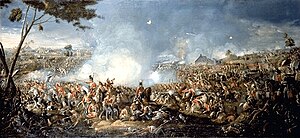თარგი:Portal:War/Intro
 |
| The Battle of Waterloo by William Sadler. |
War is a state of conflict between relatively large groups of people (such as nations, states, organizations, social groups), which is characterized by the use of armed lethal violence between combatants or upon civilians. Other terms for war, which often serve as euphemisms, include armed conflict, hostilities, and police action. War is contrasted with peace, which is usually defined as the absence of war or any armed conflict.
 |
| Battle of Gibraltar by Hendrick Cornelisz Vroom. |
A common perception of war is a series of military campaigns between at least two or more opposing sides involving a dispute over sovereignty, territory, resources, religion or a host of other issues. A war to liberate an occupied country is sometimes characterised as a "war of liberation", while a war between internal elements of the same state may constitute a civil war.
A battle is an instance of combat in warfare between two or more parties wherein each group will seek to defeat the others. Battles are most often fought during wars or military campaigns and can usually be well defined in time, space and action. Wars and campaigns are guided by strategy whereas battles are the stage on which tactics are employed. German strategist Carl von Clausewitz stated that "the employment of battles to gain the end of war" was the essence of strategy.
Military history is the recording, in writing or otherwise, of the events in the history of humanity that fall within the category of conflict. This may range from a melee between two tribes to conflicts between proper militaries to a world war affecting the majority of the human population.